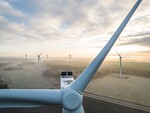04/18/2005
USA - Windmill deemed not tall enough
A student study has found the windmill installed at the school as an energy-saving device and teaching tool is producing only one-fifth of the electricity expected. "It just isn't tall enough," said high school math teacher Sharon Fadden, who studied the tower and wind currents with her students. "It should have been a lot higher." Fadden was unwilling to comment further on the study.
The 96-foot monopole tower, raised 18 months ago, produces about $400 in electricity a year compared to the anticipated $2,000 a year, according to School Director Fred Kitchel. "It has its initial teething problems here in the beginning," said John L. Zimmerman, president of Vermont Environmental Research Association, a consulting firm that deals mainly with wind power research. He said it will take time to perfect windmill technology, such as gauging proper tower heights. John Rapoza, Danville School's technical coordinator, was unwilling to elaborate on how tall the tower should have been for the desired $2,000 a year output.
A $39,150 federal grant provided for the tower's construction, said Erin Bralich, federal programs administrator of the Vermont Department of Public Service. The money was paid in three instalments, she said, and secured by U.S. Senator Jim Jeffords, I-Vt. The money was part of a $1.5 million grant from the government for small wind projects. Power created by the tower is used in the school. So far, Rapoza said, the windmill has produced a total of about 3,800 kilowatt/hr, and makes enough electricity to power a small house. Besides producing power for the school, the windmill is a great teaching tool and exposes students to the workings of alternative energy sources, he said. The monopole tower stands 96 feet tall and is designed to be lowered to the ground with a winch for maintenance. The windmill is slated for a new propeller blade, which should increase efficiency by 30 percent, Rapoza said.
"I guess it would be more efficient with a higher tower, but then you can't winch it down," Kitchel said. A new propeller with longer individual blades would significantly boost the windmill's output, Zimmerman noted. "It was a great addition to the curriculum," said Bob Johnson of the Vermont Principal's Association and principal of Danville School from 1996-2003. "Looking at alternative energy sources is a must today." Students helped assemble the tower and now take readings from a meter measuring the windmill's output. Math students determine the tower's height by shadows and formulas and the school offer alternative energy classes in the summer that also cover the workings of solar water heaters. Zimmerman said the major educational component to this program stretches beyond teaching students about wind power. The erecting of towers throughout the state will expose citizens to - and eventually familiarize them with - alternative power sources, Zimmerman said. He speculates that in the future more residents will use windmills as power sources for their homes and farms. The advent of more windmills, Zimmerman said, would also spawn a new service industry. Of wind power in Vermont, Rapoza said, "If you've got the right conditions I think it's very feasible."
The 96-foot monopole tower, raised 18 months ago, produces about $400 in electricity a year compared to the anticipated $2,000 a year, according to School Director Fred Kitchel. "It has its initial teething problems here in the beginning," said John L. Zimmerman, president of Vermont Environmental Research Association, a consulting firm that deals mainly with wind power research. He said it will take time to perfect windmill technology, such as gauging proper tower heights. John Rapoza, Danville School's technical coordinator, was unwilling to elaborate on how tall the tower should have been for the desired $2,000 a year output.
A $39,150 federal grant provided for the tower's construction, said Erin Bralich, federal programs administrator of the Vermont Department of Public Service. The money was paid in three instalments, she said, and secured by U.S. Senator Jim Jeffords, I-Vt. The money was part of a $1.5 million grant from the government for small wind projects. Power created by the tower is used in the school. So far, Rapoza said, the windmill has produced a total of about 3,800 kilowatt/hr, and makes enough electricity to power a small house. Besides producing power for the school, the windmill is a great teaching tool and exposes students to the workings of alternative energy sources, he said. The monopole tower stands 96 feet tall and is designed to be lowered to the ground with a winch for maintenance. The windmill is slated for a new propeller blade, which should increase efficiency by 30 percent, Rapoza said.
"I guess it would be more efficient with a higher tower, but then you can't winch it down," Kitchel said. A new propeller with longer individual blades would significantly boost the windmill's output, Zimmerman noted. "It was a great addition to the curriculum," said Bob Johnson of the Vermont Principal's Association and principal of Danville School from 1996-2003. "Looking at alternative energy sources is a must today." Students helped assemble the tower and now take readings from a meter measuring the windmill's output. Math students determine the tower's height by shadows and formulas and the school offer alternative energy classes in the summer that also cover the workings of solar water heaters. Zimmerman said the major educational component to this program stretches beyond teaching students about wind power. The erecting of towers throughout the state will expose citizens to - and eventually familiarize them with - alternative power sources, Zimmerman said. He speculates that in the future more residents will use windmills as power sources for their homes and farms. The advent of more windmills, Zimmerman said, would also spawn a new service industry. Of wind power in Vermont, Rapoza said, "If you've got the right conditions I think it's very feasible."
- Source:
- Online Editorial www.windfair.net
- Author:
- Trevor Sievert, Online Editorial Journalist
- Email:
- press@windfair.net
- Keywords:
- USA, wind energy, renewable energy, wind farm, wind turbine, windmill, rotor-blade, offshore, onshore


























